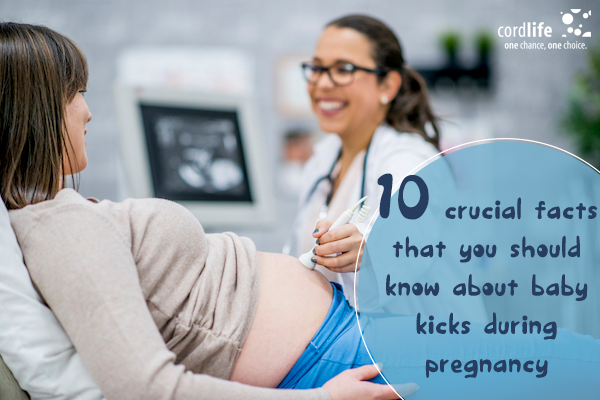Table of Contents
Baby kicks are important parts of fetal development because it helps to make baby’s growing joints and bones stronger. The fetal activity rises to its peak at night, and their movements can be detected effortlessly when the mother is in a quiet state like lying down or sitting. It important to keep track of fetal movements as it indicates that the baby’s growth is healthy and normal.
For an expecting mother, one of the most delightful moments is when she feels her baby’s kick for the very first time. If you are a mom-to-be, these little kicks will relentlessly remind you that a vibrant life is thriving inside. With time, baby kicks become more regular and stronger as your baby continues to develop. It is vital for you to pay attention to these kicks because these are your baby’s own ways of communicating with you. Here are 10 vital facts about baby kicks that you should know.
- Babies start bending their necks from the 7 weeks of pregnancy. By 15 weeks, the fetus starts making many more movements like punching, yawning, stretching, moving its head, and thumb sucking. After a few weeks, babies also start opening and closing their eyes. However, you will feel only the like punching, kicking, and hiccups
- These baby kicks get stronger noticeably increases between 20 and 30 gestation weeks. Afterward, movement starts to reduce by 35 weeks as the baby grows in size and doesn’t have enough room inside to make movements. This time frame clearly indicates that baby kicks reach their peak when the baby’s joints and bones begin to take shape.
- Most pregnant women experience maximum fetal movement at night.. , since you and your baby are less active and more relaxed at night.
- When you are on your left side, the blood circulation improves. And, this is when you are most likely to feel that your baby is making more attempts to make its presence felt.
- Babies respond by kicking when you have eaten something. Even though spicy and sugary foods trigger a lot of fetal movements you should always avoid such foods and go for foods that are more nutritious. Your healthy eating habit is the key to the well-being of the little one developing inside you.
- Babies also respond to noise by kicking. More often than not, you can feel your baby’s gentle movements when you talk. However, noisy surroundings can cause them to feel irritated. So, you should stay away from loud noises and make your baby feel comfortable.
- Babies don’t like to be exposed to bright lights. They prefer dark and silent environment. They make more movements as an attempt to stay away from light. They like dark, quiet environments. Therefore, you should try and not to expose your belly to bright lights and make your baby feel agitated.
- An expecting mother’s health condition also goes a long way in determining the level of her baby’s activity. If you are a smoker or your eating habits are not healthy or if you are going through a lot of stress the fetal movement will also become irregular and weaker.
Baby movements do not increase after 32 weeks of gestation. As the baby gains weight and becomes stronger, he runs of space inside the womb. This is when your doctor might ask you to keep count of you baby movements on a daily basis.
Mostly in the third trimester you get familiarized with your baby’s movement pattern. It is always prudent to consult your gynecologist if your instincts tell you that something is not right in connection to your fetal movement.
Conclusion
Every baby is unique and so are their movements, some are more active than the other. Hence it is extremely important to monitor your baby’s kicks regularly and get in touch with your doctor if you feel any changes. It is always better to be reassured.
